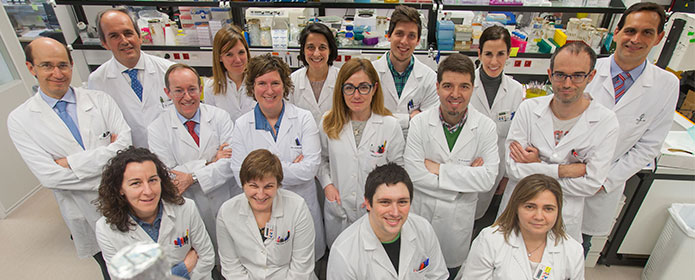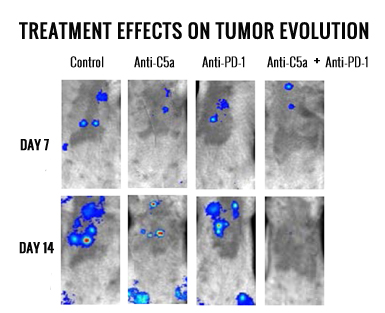2017-03-28-Noticia-CIMA-Nueva inmunoterapia combinada podría mejorar el tratamiento del cáncer de pulmón
New combined immune immunotherapy may improve lung cancer treatment
Researchers at CIMA of the University of Navarra showed that the combined blockade of C5a and PD-1 proteins inhibits the growth of the tumor and prevent metastasis in animal models

Researchers at the Center for Applied Medical Research (CIMA) of the University of Navarra have developed an immunotherapy technique which greatly improves the treatment of lung cancer in animals. The results have been published in the journal Cancer Discovery, a prestigious publication in the field of oncology research.
Immunotherapy, based on the stimulation of the immune system so as to recognize and destroy tumor cells, has become a powerful tool in the treatment of lung cancer, the main cause of death from cancer all over the world. The monoclonal antibodies against PD-1 (a receptor involved in the suppression of antitumor activity in the immune cell system) have already been approved by the US Food and Drug Administration (FDA) and the European Medicines Agency (EMA) for patients with the most common type of lung cancer (non-small cell metastatic lung cancer). “However, this inhibition cannot reverse all the resistance mechanisms and a high percentage of patients (approximately 70-80%) do not respond adequately to this treatment. For this reason, it is fundamental to find combined therapies which block more than one immunomodulator channel in order to improve the antitumor effectiveness of anti-PD-1 individual treatments”, explained Dr. Rubén Pío, director of the Solid Tumors and Biomarkers Program at CIMA, who is the director of the study.

The objective of the work carried out in CIMA focuses on overcoming tumor resistance to cancer immunotherapy. It is known that the C5a protein favors the progression of lung cancer by recruiting immunosuppressant cells which contribute to the inhibition of the antitumor immune response. In this context, said Dr. Daniel Ajona, a CIMA researcher and lead author of the work, “We hypothesized that the inhibition of this protein could reverse this immunosuppressant area, and strengthen the effectiveness of the clinically approved anti-PD-1 treatments. In our laboratory we have administrated a combination of anti-PD-1 and anti-C5a drugs in various preclinical lung cancer models and have found that this strategy significantly reduces the growth of lung tumors and their metastatis to the bone. The relevance of our study is that it proposes an innovative therapeutic approach for patients with this type of tumor", Dr. Ajona.stated.
This study has been carried out thanks to the funding of the Foundation for Applied Medical Research, the Centro de Investigación Biomédica en Red (CIBERONC), the Thematic Network for Cooperative Research into Cancer, the Foundation for Healthcare Research-European Regional Development Fund (FEDER), the European Commission, the “la Caixa” Foundation and the Caja Navarra Foundation.
Reference: A Combined PD-1/C5a Blockade Synergistically Protects Against Lung Cancer Growth and Metastasis.
Daniel Ajona, Sergio Ortiz-Espinosa, Haritz Moreno, Teresa Lozano, MariaJ. Pajares, Jackeline Agorreta, Cristina Bértolo, Juan J Lasarte, Silvestre Vicent, Kai Hoehlig, Axel Vater, Fernando Lecanda, Luis M. Montuenga and Ruben Pio.
Published Online First: March 23, 2017. Doi: 10.1158/2159-8290.CD-16-1184
